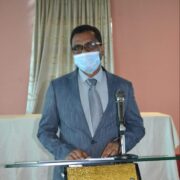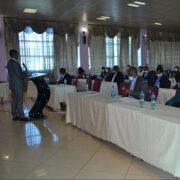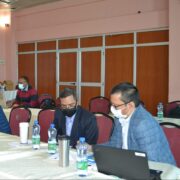MCH research prioritization in Ethiopia: a consensus-building workshop with 36 stakeholders
HaSET, Addis Ababa February 2-3, 2021




With an effort to identify and prioritize maternal, newborn, and child health (MNCH) research topics in Ethiopia, HaSET conducted a series of key informant interviews (KIIs) with MNCH experts, designed an online Delphi questionnaire using the findings from these KIIs, and administered it to MNCH program leaders, policy makers, program implementers, researchers, funders and experts. Through the partnership of the Ethiopian Public Health Institute (EPHI), a consensus workshop was held to discuss the results of this questionnaire and establish consensus on prioritizing MNCH research topics that can be answered through the HaSET MNCH research program and other platforms.
The workshop took place in Addis Ababa, Ethiopia at Sarem International Hotel on February 2 and 3, 2021. The workshop was attended by MNCH experts from the Ministry of Health (MoH), EPHI, Regional Health Bureau (RHB) and Universities, Scientific Advisory Group (SAG) members, Research Advisory Council (RAC) maternal, newborn and child health thematic members, MNCH program leaders, MNCH implementers, donors, MNCH experts, and HaSET MNCH implementation and postdoctoral fellows.
Dr. Lisanu Taddesse, the HaSET Program Director welcomed the participants to the workshop by describing the program and introducing the agenda. The HaSET (“happiness” in Amharic) research platform in Ethiopia is a collaborative effort across the Harvard T.H. Chan School of Public Health (HSPH), St. Paul’s Hospital Millennium Medical College, and the Ethiopian Public Health Institute. HaSET serves as an umbrella platform to 1) build local research capacity for MNCH in Ethiopia; 2) to identify, prioritize, and conduct MNCH research questions in Ethiopia; and 3) to translate evidence to policies and programs.
In his opening remark, the EPHI Deputy Director-General, Dr. Getachew Tolera, stressed the need to utilize the comparative advantages of the three HaSET partner institutions in setting priorities, undertaking research, building capacity, and translating evidence to policy. He noted that even though MNCH research has been conducted for many years in Ethiopia, there are very few products that have been successfully translated into national policy and/or clinical protocols to be used for decision making. He also thanked notable participants for coming to the workshop and for their valuable contributions to this end. He emphasized to participants EPHI’s commitment to improving MNCH in under-served populations by identifying and prioritizing through epidemiological methods the discovery and delivery of evidence-based decisions, while at the same time training the next generation of researchers and working with relevant stakeholders.
The MCH delegate from the Ministry of Health (MoH), Professor Mirkuzie Woldie, delivered his keynote speech on behalf of the MCH director. The MoH is delighted to collaborate with HASET to organize this event, as it is in line with the priorities of the government of Ethiopia in addressing maternal and child health policy gaps through evidence-informed decisions. To reach Health Sector Transformation Plan (HSTP) II targets, we need evidence-informed policies, guidelines, and practices as well as innovations that will facilitate demand and service delivery. We know that evidence is being generated by different actors such as research institutes, universities, partners, and other stakeholders. The Federal Ministry of Health is always ready to adopt and use new cost-effective, high-impact interventions if the evidence suggests. He promised to utilize the outcomes of this research prioritization and disseminate the topics to other stakeholders, especially researchers, graduate and postgraduate students who wish for their results to have a greater impact.
During the two-day stay of the consensus building workshop, the HaSET scoping review of 72 years of MNCH research in Ethiopia was presented and discussed by Dr. Delayehu Bekele, HaSET Co-Principal Investigator. The World Health Organization’s experience in newborn health research priority setting was also presented by Dr. Hazarika Indrajit.
Following the presentation of key KII findings and the online survey results of the formative assessment by Dr. Lisanu Taddesse, workshop participants individually scored the list of priority MNCH research questions identified through both the KIIs and online survey. Next, in thematic groups, they identified the five top priority questions to advance MNCH in Ethiopia. The groups’ consensus was then discussed in plenary for further comments. The three groups were 1) Maternal Health, 2) Newborn Health and 3) Child Health and Health Systems. All three groups produced their priority research questions with both group and individual scores.
On the second day, each workshop participant presented their agreement or disagreement scores on the Delphi research statements about the MNCH research environment in Ethiopia, and they had a round of discussion in groups to identify and prioritize 2 – 5 research environment statements to be recommended to the HaSET MCH research program and other stakeholders. Each group presented their top research environment areas for plenary discussion and comment.
The workshop then outlined the next steps in the priority-setting exercise, including the gathering of community perspectives, sharing of findings, and brainstorming on how to reach wider stakeholders for utilization and follow-up.
The workshop was concluded with closing remarks from Mr. Theodros Getachew, Health System and Reproductive Health Research Directorate Director of EPHI. He appreciated the contribution of the participants and promised to follow the outlined next steps.
